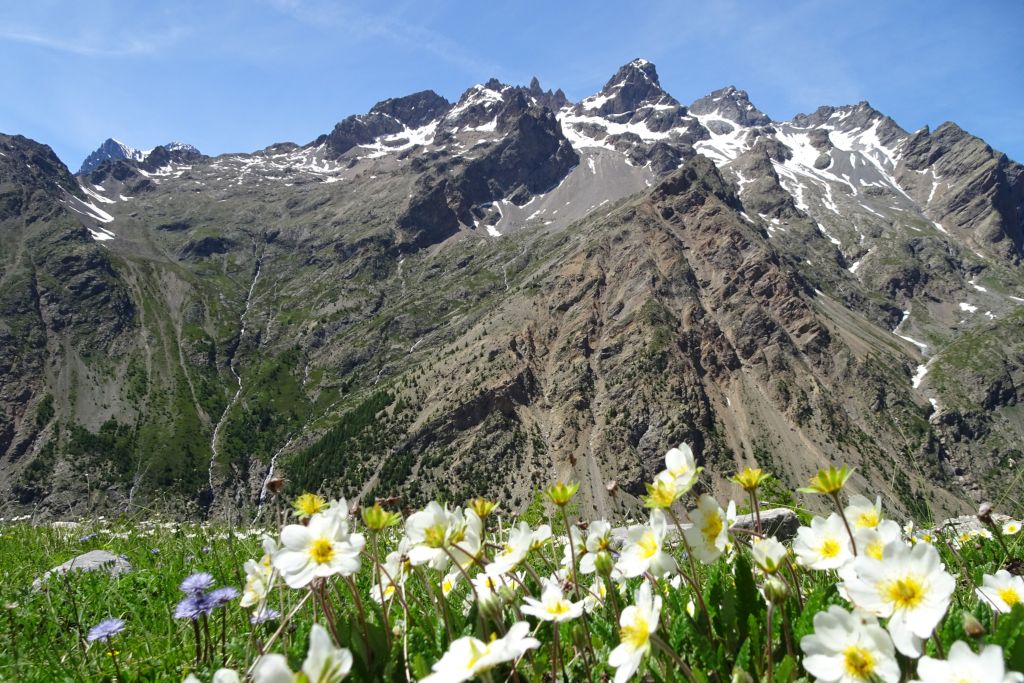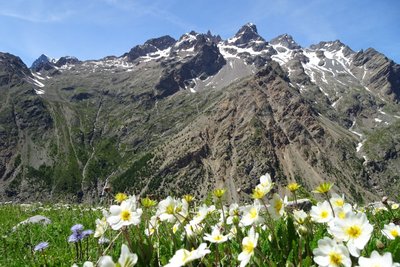THEMED PATH: In the shepherds' footsteps
“You feel rather isolated from the world on this itinerary. Yet the busy valley of Chambran is just below you. But there you are, under the high walls of the Montbrison massif. You feel so high above the world, and so small under these fortresses of limestone.” Marie-Geneviève Nicolas, park ranger at the Parc National des Écrins
Description
From Chambron, follow the track leading towards the valley bottom.
- Turn right to start the ascent.
- Make a there-and-back detour to admire the view down over the Cabane des Fons standing in the valley. Retrace your steps and then follow signs for the cabin ("Cabane"). Take the path on the right leading towards the Cabane du Clot de la Selle. The route runs close to the mountain hut, and then rises above it up an escarpment. The path then runs along the hillside; it leads across a vast scree of limestone blocks and carries on level through the alpine pasture before dropping down to the recent Cabane des Prés du Rocher.
- Take the access track to the mountain hut, to join the road. Follow it for a few hundred metres until you reach Chambran.
- Departure : Chambran
- Arrival : Chambran
- Towns crossed : Vallouise-Pelvoux
10 points of interest
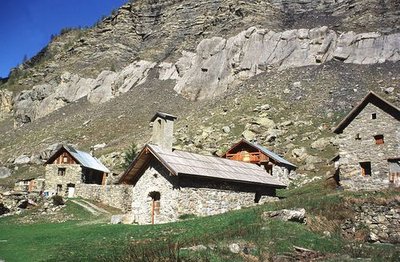
Le hameau de Chambran - Marie-Geneviève Nicolas - PNE  History
HistoryChambran Hamlet
At an altitude of 1700 meters, this hamlet is inhabited in summer, at the beginning of the summer pasture. The old dairy has been spruced up to become a snack bar. It’s pretty little chapel dedicated to Saint Jean is very simple and bare.
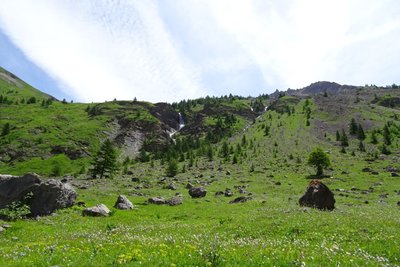
Parc à moutons - Office de tourisme Pays des Écrins  Pastoralism
PastoralismThe realm of sheep
Together with its entire catchment area, the Chambran valley constitutes an enormous alpine pasture. Sheep belonging to several different owners are gathered here for the summer grazing season. Many of them come from the department of Alpes-de-Haute-Provence. The landscape (sheep paths, old hay meadows), vegetation, built structures (old dairy, pastoral cabins)... everything has been marked by centuries of animal husbandry.
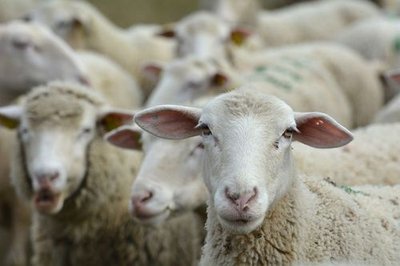
Troupeau de brebis - Mireille Coulon - PNE  Pastoralism
PastoralismEvolution of pastoralism
In the valley, the ruins of numerous piles of stones resulting from the removal of stones in the hay meadows are witness to another age. Most of these old prairies are now grazed by sheep. Pastoralism has evolved: no more local flocks so less hay, the valley is now occupied by a large flock from the Haute-Provence Alps.
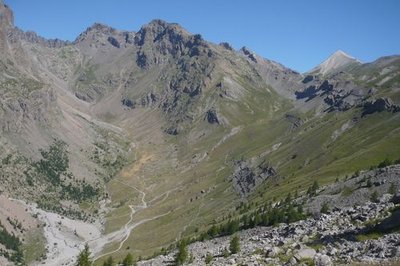
Les deux versants du vallon de Chambran - Marie-Geneviève Nicolas  Geology and geography
Geology and geographyThe front of the nappes
The two slopes of the Chambran valley are very different: the right bank, minerals are very present. There are granites and gneiss making up the crystalline base of the Ecrins massif. On the left bank, the prairies are sandstone and chalky. These are part of the glacial thrust sheet: they are ancient sediments deposited mostly to the East, in the Alpine ocean, then carried here by compression at the time of the formation of the Alps.
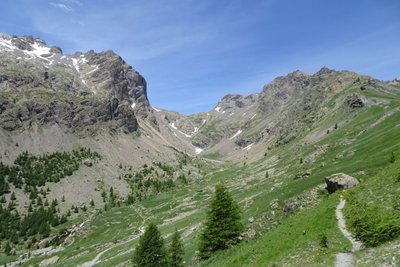
Vallon de l'Eychauda - Office de tourisme Pays des Écrins  Pastoralism
PastoralismThe old hay meadows
Lower down as you cross the area, near the pastoral Cabane de l'Eychauda, you can make out piles of stones, the clapiers formed by the removal of stones from the hay meadows. In order to feed the livestock right through the winter, it was necessary to garner a large amount of hay! With changes in livestock farming practices, there are no longer cut for hay, but used for grazing. Only a tiny area of the valley - the flattest - is still mown for hay, mechanically.
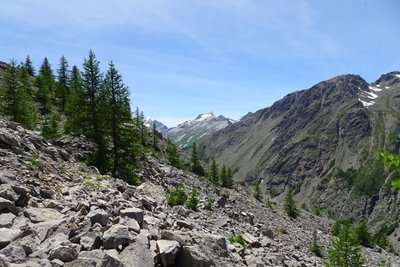
Le pierrier - Office de tourisme Pays des Écrins  Geology and geography
Geology and geographyThe scree
The path winds around large blocks of limestone, fallen from the overlooking cliffs. Limestones are ancient sediments, deposited on the alpine ocean seafloor and then raised up, folded, solidified, broken and displaced by the compression forces which resulted in the disappearance of the ocean and the formation of the Alps.
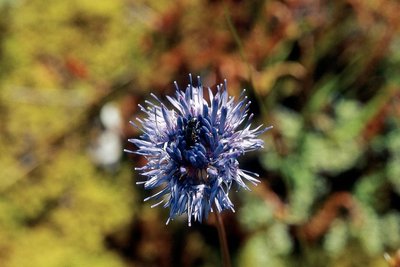
Globulaire à feuilles en coeur - Bernard Nicollet - Parc national des Écrins  Flora
FloraThe heart-leaved globe daisy
This little carpet-forming plant is characteristic of rocky limestone terrain. Its leaves are indented at the tips, giving them the appearance of a heart - with a little imagination! The purple-blue flowers are arranged into little round heads, hence the name, globe daisy. It is a very fast coloniser and can cover stony ground and boulders... even to the point of being invaded itself by other plants once it has fixed the soil.
 Geology and geography
Geology and geographyThe panorama
The slope opposite, on the right-hand side of the Chambran valley, is part of the crystalline basement of the Les Écrins massif. The peaks and needles of granite and gneiss are quite unlike the imposing limestone cliffs overlooking the path! The glaciers left their mark here, carving out the rock and then leaving behind vast stretches of moraine as they retreated. Unfortunately, the Séguret glacier up ahead, extremely reduced in size and having retreated to the bottom of its cirque, has not escaped the effects of climate change.
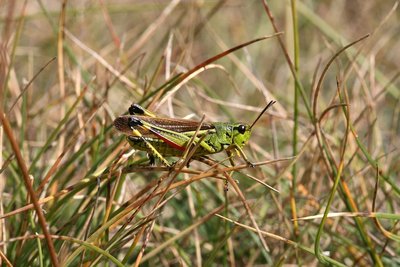
Criquet ensanglanté - Bernard Nicollet - Parc national des Écrins  Fauna
FaunaCrickets in the alpine meadows.
It is high summer and at the hottest time of the day the crickets start to chirp. The presence of crickets in an alpine meadow, their density and diversity are signs of the quality and good management of the meadow. If cricket numbers are low, the meadow is over-grazed!
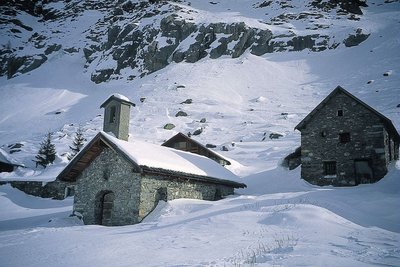
Les chalets de Chambran sous la neige - Marie-Genevève Nicolas - PNE  Vernacular heritage
Vernacular heritageChambran chalets
Remnants of a way of life that has disappeared, the Chambran chalets were once a high-altitude village where flocks stayed during the summer months. Today this is a welcome stop along the GR54 and the starting point for hikes towards Lake Eychauda.
Forecast
Altimetric profile
Recommandations
Some sections of the circuit are vertiginous and pass through rocky screes on the mountainside. Depending on their walking ability, young children may have difficulties crossing them.
Binoculars are recommended for observing the fauna
Check weather conditions before setting off.
Rescue services contact details: Secours Montagne (Mountain Rescue): +33 (0)4 92 22 22 22 or 112
Show consideration for the work of farmers, livestock keepers and owners
Close all gates behind you
Take your litter home
Do not take shortcuts across pastureland
Information desks
Place de l'Eglise, 05340 Vallouise
Vallouise Park house
, 05290 Vallouise
Information, documentation, models, exhibitions, screenings, product sales and works of the Park. Guided tours for school, reservation required. The new Park House opened in Vallouise since June 1, and offers visitors an interactive permanent exhibition inviting to explore the area and its heritage. A temporary exhibition space will allow a renewed offer. Finally, the device is completed by an audiovisual room to organize screenings and conferences Free admission. All animations of the Park are free unless otherwise stated.
Transport
Public transport >> www.pacamobilite.fr
Consider car-sharing >> www.blablacar.fr
For more information, ask at the Tourist Information Office nearest to the trail starting point.
Access and parking
18 km from L'Argentière-La Bessée, take the D994E.
Parking :
Source

Report a problem or an error
If you have found an error on this page or if you have noticed any problems during your hike, please report them to us here:

